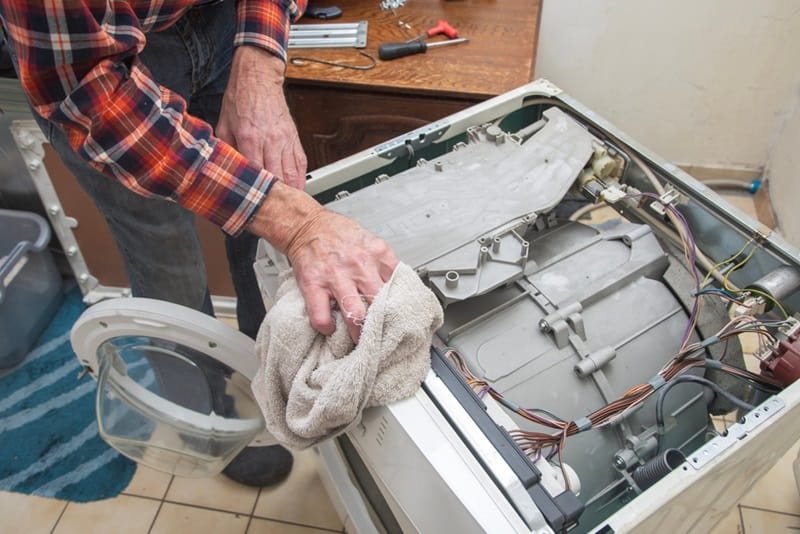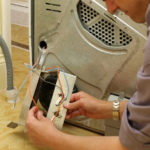Just loaded the washing machine, added detergent, pressed go and nothing happened? It’s annoying isn’t it when the washing machine stops working.
You may try a few basic troubleshooting exercises to get it going again, but conclude that it needs a professional to repair it.
Is it worth paying to have it repaired, or should you just buy a new machine?
There’s no right or wrong answer. Whether you repair your washing machine or not boils down to several variables. Let’s look at them in more detail.
How Old Is the Washing Machine?
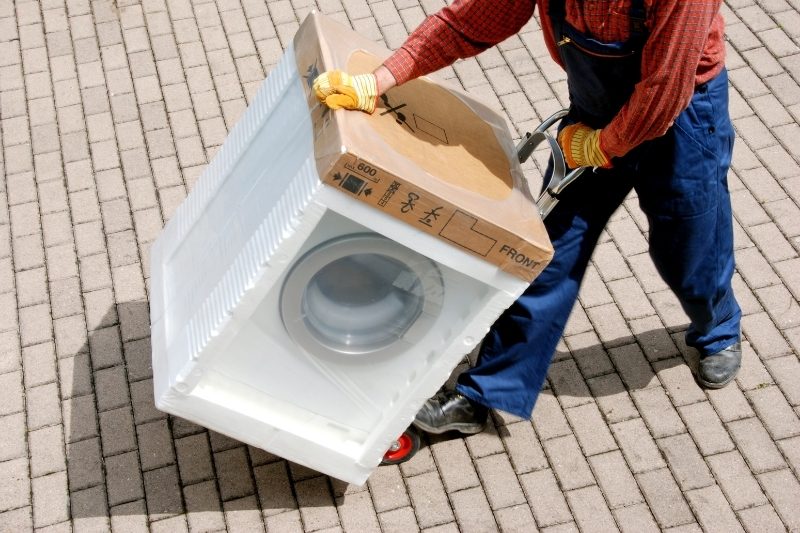
A well-looked-after washing machine should last at least six years. Obviously, how well you look after the appliance and what make you get play a huge role in how long it’ll last. But in general, you should get a number of years of use out of a machine.
With this information in mind, ask yourself how old your washing machine is. Based on your answer, you’ll have a better idea about whether it would be worth fixing your washer or getting a new one.
For example, if your washing machine is three years old, it’s still in its infancy and should have many years left! In this case, you should consider getting the machine fixed because it may be under warranty, and it really shouldn’t have died on you quite so soon into its life.
In contrast, if your machine is eleven years old. Your washing machine has had a good run and has worked far longer than the shortest expected lifespan. In this case, whether you fix or buy a new machine depends on the problem, how easy the issue is to fix, and what costs are involved. Your answer to these questions will directly impact your decision.
When your machine hits its average lifespan, it’s often a tough call to make: repair or replace. So, make sure you consider all of the additional points below before you make a final decision.
Tip: There’s no harm in speaking to a specialist to get a quote for the repair work. Make sure that the person doesn’t charge you, though.
What’s Caused the Machine to Stop Working?

When your washing machine stops working, your first step should be to check your user manual and read the troubleshooting section to see if you can figure out what the problem is.
The issue you’re experiencing may be under one of the headings. Consequently, you’ll be able to sort out your washer quickly, and it won’t cost you a penny!
Ultimately, the manual may suggest that you have a significant problem and need an engineer to come out and fix it.
If the guidebook doesn’t say anything, you can do some online research into the problem to try and narrow down the issue.
At this point, you should have a better idea about the problem and how it’ll need to be fixed. Some jobs you’ll identify straight away as easy-to-fix ones and vice versa.
Tip: If you’re going to call someone out to do the repair work, get lots of quotes so you can choose the best and reasonably priced person.
Is the Problem Easy to Fix?
Once you know what type of problem you have, you can assess how easy the problem is to fix in more detail. From this point, you can determine if the repair work is something you want to take on or not.
You can look at this in two ways: how easy it is to get parts and who can do the work.
Replacement parts
You must establish early on if you’ll be able to get the required parts to repair your washing machine.
Getting hold of parts for modern washing machines is more straightforward. So, there shouldn’t be a problem. You may have to wait for parts to come into stock, but this isn’t a big issue.
In contrast, you may have trouble finding generic and non-generic parts for older washing machines. Ultimately, you might be left with no option other than to replace the appliance if this happens.
Carrying out the repair work
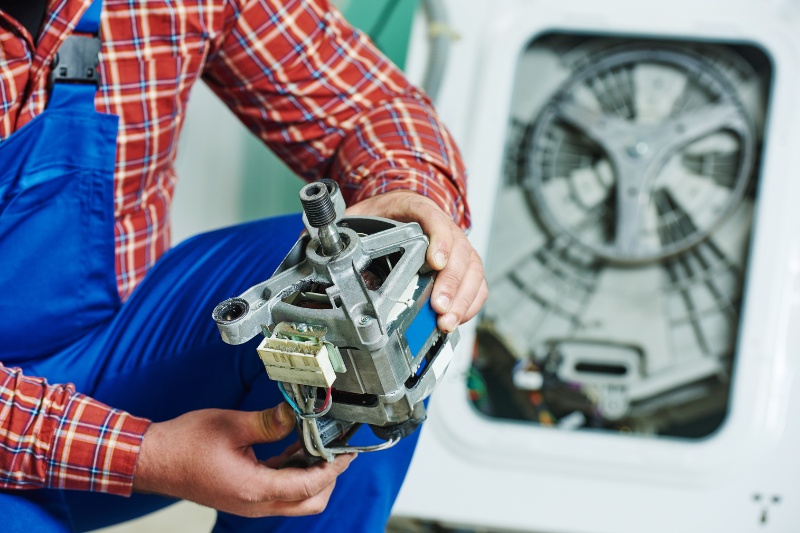
In addition to getting the correct parts, consider whether you can carry out the repair yourself or if you need help. Help usually comes at a cost, but that’ll be discussed later.
Some problems you can sort out yourself. These include installing a new seal, sorting drainage issues, replacing a broken hose, and removing foul smells.
However, some problems need a specialist’s input. These include a cracked drum, a new motor, or a faulty microchip.
The more people you have to call to fix the problem, the more complicated it becomes.
Tip: Always check to see if your washing machine is covered by a warranty.
Is the problem costly to fix?
It’s always worth running through all the potential costs involved with your repair before it takes place. Take note of the following expenses:
The physical parts
If you have a new washing machine, you may be covered by a warranty, so there won’t be any cost involved. This includes replacing the parts and labour. However, if you’re not covered by a warranty, you must consider the following.
Generic parts like hoses are often easy to come by and cheap to buy. However, the more intricate the part, the more it will cost to buy, and you may have to wait for the part to be delivered to you.
In general, repairs for high-brand washers cost more because they’re packed with modern technology designed to aid the washing process.
If you’ve got one of these state-of-the-art machines that’s an all-singing, all-dancing appliance, you will be charged more for the parts compared to a cheaper model.
On the other hand, if your machine is old, you’ve got to face facts and accept that some parts may not be available anymore. So, you won’t be able to repair your appliance.
A good rule is: If the repair costs more than 50% of the initial cost of the machine, you might as well get a new appliance.
For example:
A new washing machine costs £500 to buy. The repair on your old appliance costs £100.
£100 isn’t close to half the cost of a new washing machine (£250), so you should consider repairing the machine.
Labour
Labour costs will vary depending on:
- Who comes out to do the work – an engineer from a big company or a local specialist?
- When you call them out – is it a weekday or weekend?
- How long do they have to work for?
- How intricate the repair work is.
Sometimes, the labour costs more than buying the part that needs replacing!
It’s also worth finding out if you have to pay an initial call-out fee. For example, you may have to pay for an engineer to come out and look at the machine. Then, pay them to return and fix the appliance.
Important questions you need to consider asking beforehand, include:
- How much will you be charged per hour for the repair work?
- Is it a day’s worth of work or longer?
- What happens if the person has to come back multiple times? Do you get charged each time?
It’s better to ask lots of questions early on so that nasty surprises don’t catch you out!
Your location
Where you live will also determine some of the costs you’ll face. For example, inner-city repairs will likely cost more than those in rural regions.
It’s also worth noting that you may have to cover congestion charges, too! Like the ones in Bristol. They may be tacked on the end of your bill. Similarly, if you’re going with a local person, they may add fuel costs to the bill.
Of course, these issues won’t happen to everyone. Nonetheless, it’s worth watching for hidden costs like these.
When the work is done
Another factor influencing cost is when the repair work is carried out. For example:
- Weekends will cost more.
- Bank holidays and special holidays throughout the year will be pricey times.
- Emergencies will likely incur a fee.
Tip: Make sure you hire workers who have the right qualifications and are reputable. Don’t be taken in by a random person who claims to be a washing machine repair expert and charges you a fortune.
Has the machine broken down before?
Before proceeding with any repair work, consider if you’ve already had to repair the washing machine. If so, how many times and how much have you spent already?
If you’ve already spent a lot, is this next repair something you want to do? Or would it be easier to buy a new machine?
At some stage, you’ve got to accept that you can’t keep on repairing a machine that is growing weaker. It’s not reasonable. It would, therefore, be better to get a new appliance.
Tip: If you’ll be calling someone out to fix your washer immediately, accept that you may be charged more. If you want work carried out within a day, engineers will likely put some kind of ‘emergency rate’ on your bill.
Your budget
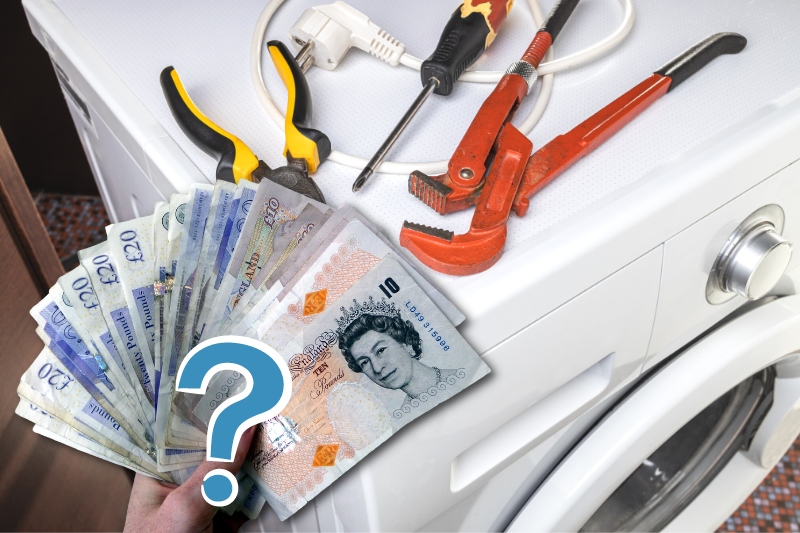
Your budget and personal situation will determine your next step in the repair or replacement process. Make sure you consider all the costs you could face – even the hidden ones!
Some ideas:
If you’re on a tight budget, it may be better financially for you to repair your current washing machine and replace it later.
However, if you’ve bought a high-end washing machine that’s cost you a lot but has broken, it may be worth repairing it because you’ve already invested a lot in the machine.
In contrast, if you’ve bought a low-to-mid washer, it may be worth replacing it because the repair costs are too high. Investing money in the machine wouldn’t make sense because you could get a new model using the cash.
Tip: Check forums to see if people with the same washing machine have had similar problems. A quick read-through may highlight what’s wrong with your machine and how to fix the problem quickly and cheaply.
Efficiency of washing machine

As washing machines age, their efficiency deteriorates. Naturally, wear and tear-related problems affect how the washing machine works and how well it cleans laundry.
The machine may use more power than expected, its cleaning abilities may not be up to standard, and you may have to run additional cycles to wash your laundry effectively.
Consequently, the additional running costs may be too much of a burden for you. And it may make more sense to get a new washing machine rather than trying to repair the faulty parts that are weakening it. A new washer that’s modern and energy-efficient would save you money in the long term.
Tip: Do a little research before you get an engineer out. You might not know what’s wrong with your washer, but you’ll be more informed when the person arrives. Consequently, you may see through their silly stories and quick fixes. And you won’t be tricked into asking them to carry out needless and, most likely, expensive work.
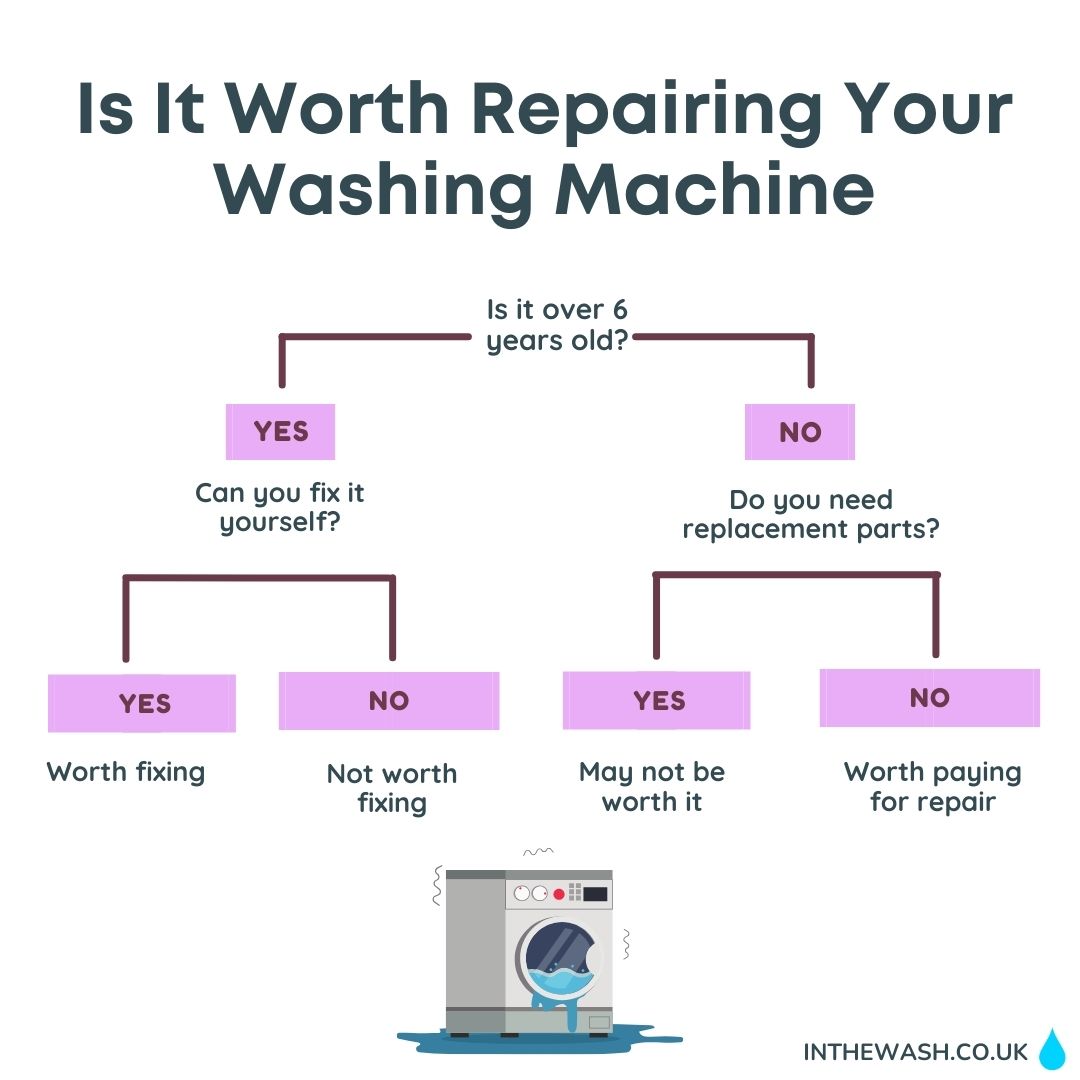
Common Signs That You Need a New Washing Machine
Not sure if your washing machine needs to be replaced? Here are a few signs that your appliance is ageing and may need replacing soon:
- There are obvious issues with the machine – it’s not washing clothes or draining water correctly, for example.
- The machine has many problems, and repairing them all would be costly.
- The washing machine is over ten years old.
- There’s a risk to your safety.
- The washer is no longer energy efficient and costs a lot to run.
- You’ve tried to fix specific problems, but the machine is deteriorating.
- The machine is leaking excessive amounts of water.
- The appliance is making weird noises – grinding metal and high pitched sounds, for example.
Is It Worth Repairing a 7-Year-Old Washing Machine?
A 7-year-old washing machine is in the midst of what would be considered its average lifespan. But this does not mean the machine is old and bound for the rubbish tip. It’s considered relatively young by many, and lots of machines run for a lot longer than a mere seven years.
Before you repair your machine, consider what’s wrong with it and how much it’ll cost to repair. Then make your decision.
Remember: The repair cost should not exceed 50% of the price you’d pay for a new washing machine.
For example:
Your 7-year-old washing machine’s microchip has broken. You’ve called an expert and they’ve given you a quote for the work (price includes parts and labour).
The cost comes to £250.
You’ve researched other washing machines and discovered an appliance that’ll cost you £400. The specs aren’t as good, but you want a basic machine this time.
Based on this information, the repair will cost you more than half of what it would cost you to buy a new machine. In this case, it makes more financial sense to get a new machine rather than repairing the existing one.
Tip: Consider what other problems your washing machine may have because of the current issue you’re facing. This may sway your decision.
Is It Worth Fixing a 10-Year-Old Washing Machine?
Whether or not you fix a 10-year-old washing machine depends on several factors, including how well the machine has been looked after, what its problem is, and how much said problem will cost to repair.
Given that the machine is well into its average lifespan, you must make sure that the repair costs involved are less than 50% of the price of a new washing machine to make the repair worthwhile.
For example:
You have a 10-year-old washing machine that has been looked after properly. This is the first real problem it has suffered.
You have assessed the issue, found a solution, and know you can do the work yourself. The entire repair will cost £50.
You’ve also done your homework on new washing machines, and the one you’d buy is £500.
In this example, doing the £50 repair is more valuable than buying a new washing machine. (This is based on the washing machine not having any existing problems.)
Should You Repair a 15-Year-Old Washing Machine?
Consider all the points above before you get your 15-year-old washer repaired. But keep in mind that at 15 years, your machine has more than passed its average lifespan. The fact that it has lasted so long is a nod to how well you’ve looked after the machine over the years.
The trouble is when a machine reaches 15 years of age, lots of minor problems start to kick in. And even though you can absorb the repair costs initially.
Eventually, you have to ask yourself, ‘At what point do I stop absorbing the extra costs and accept that the machine is old and it’s time for a new washing machine?’.
At some stage, the appliance will deteriorate so much that it’ll either be costly to buy the right parts to fix it, or you won’t be able to get hold of the parts anyway! So, the decision will be made for you.
It would, therefore, make sense to buy a new machine that is more energy-efficient, modern, and convenient.
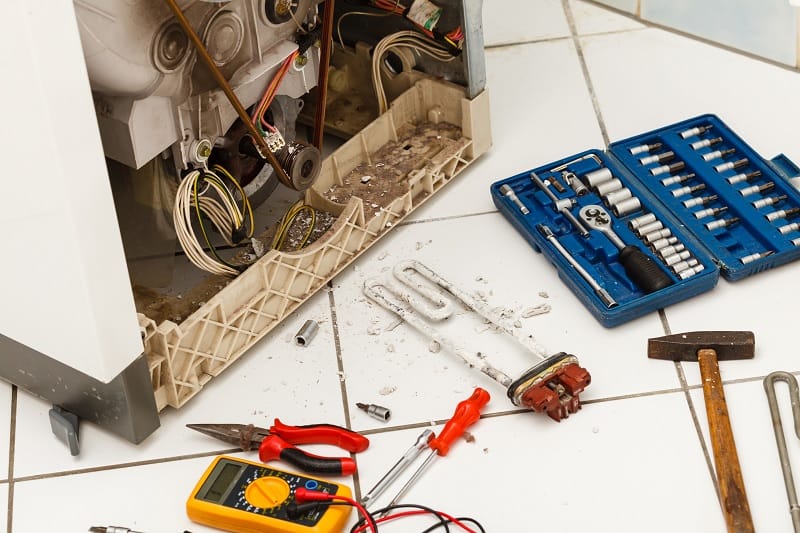
Post Repair: Ideas to Keep Your Washing Machine Working
If you’ve had your machine fixed, consider changing your usage habits to ensure the problem doesn’t happen again and that your appliance has a long and generally healthy life.
- Make sure you clean your washing machine often.
- Ensure the hose is cleaned and isn’t stuffed with dirt.
- Be sure to check the filter regularly and empty the gunk out of it.
- Don’t overload your washer and put needless strain on it.
- If you spot, hear or smell an issue, do something about it. Don’t let it get worse!
- Get to know what type of water is going into your machine – hard or soft – and put measures in place to manage potential problems like limescale (in hard water zones).
- Consider how many loads of washing you do per week and if you could reduce the count so that the machine isn’t constantly in use.
- Treat your machine with care – don’t slam the door or ram clothes into the drum, for example.

Bethan has a passion for exploring, reading, cooking and gardening! When she’s not creating culinary delights for her family, she’s concocting potions to keep her house clean!
